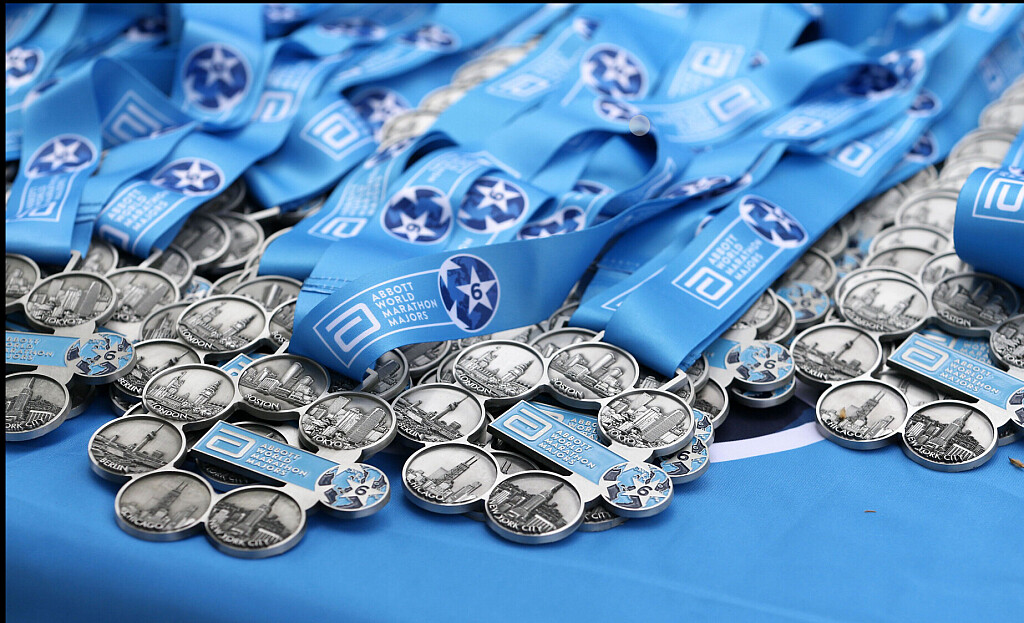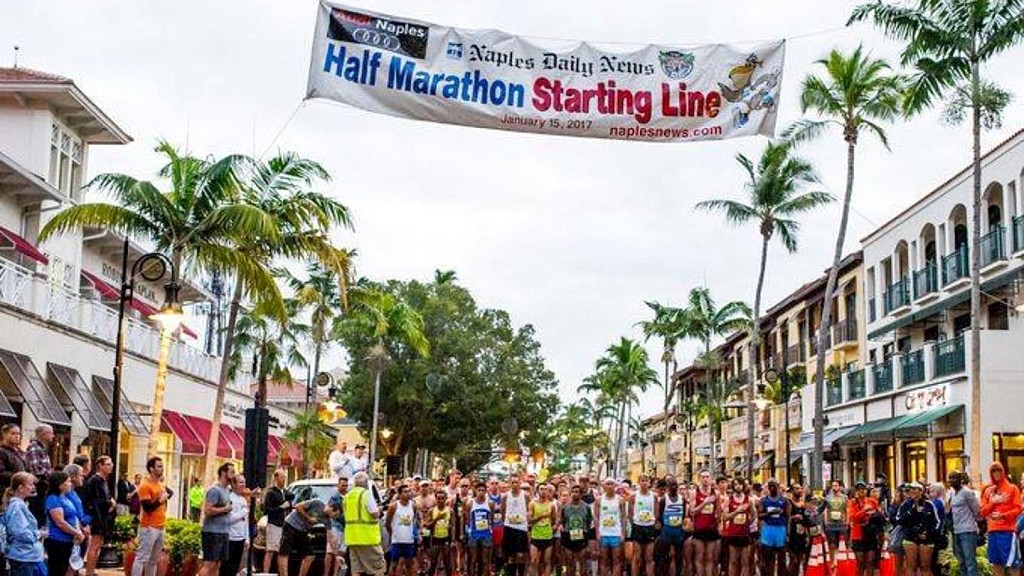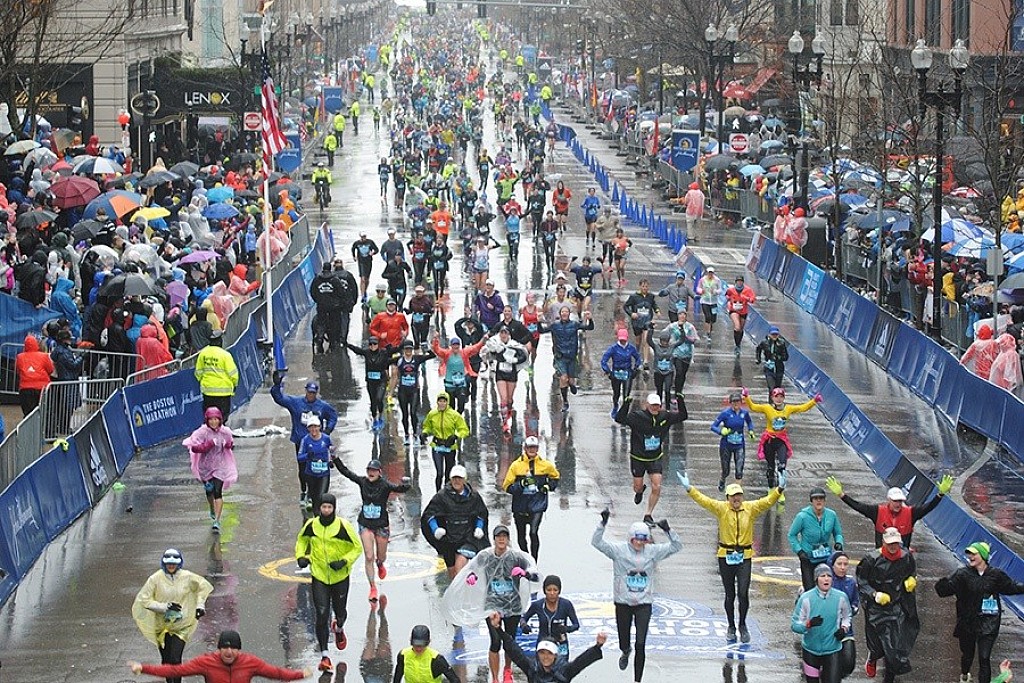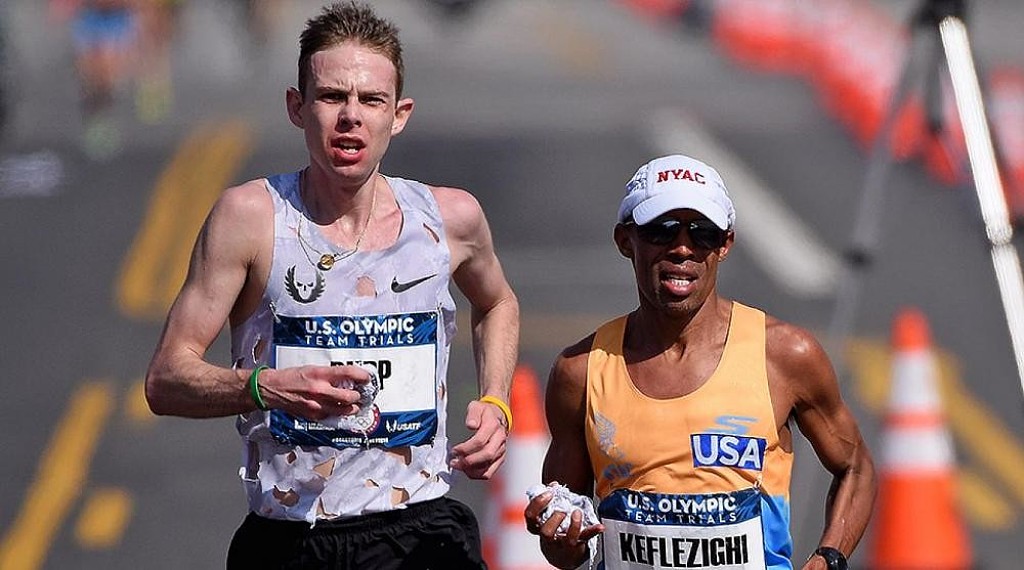Running News Daily
Running News Daily is edited by Bob Anderson. Send your news items to bob@mybestruns.com Advertising opportunities available. Train the Kenyan Way at KATA Kenya and Portugal owned and operated by Bob Anderson. Be sure to catch our movie A Long Run the movie KATA Running Camps and KATA Potato Farms - 31 now open in Kenya! https://kata.ke/
Index to Daily Posts · Sign Up For Updates · Run The World Feed
Articles tagged #gun time
Today's Running News
Controversy Arises Over Boston’s Moving 6-Hour Results Cutoff
For back of the packer, heartbreak is learning their finishes are not official, even though they have times.
Laura Caster wants to be clear: She knew what the Boston Marathon rule was about official finishers.
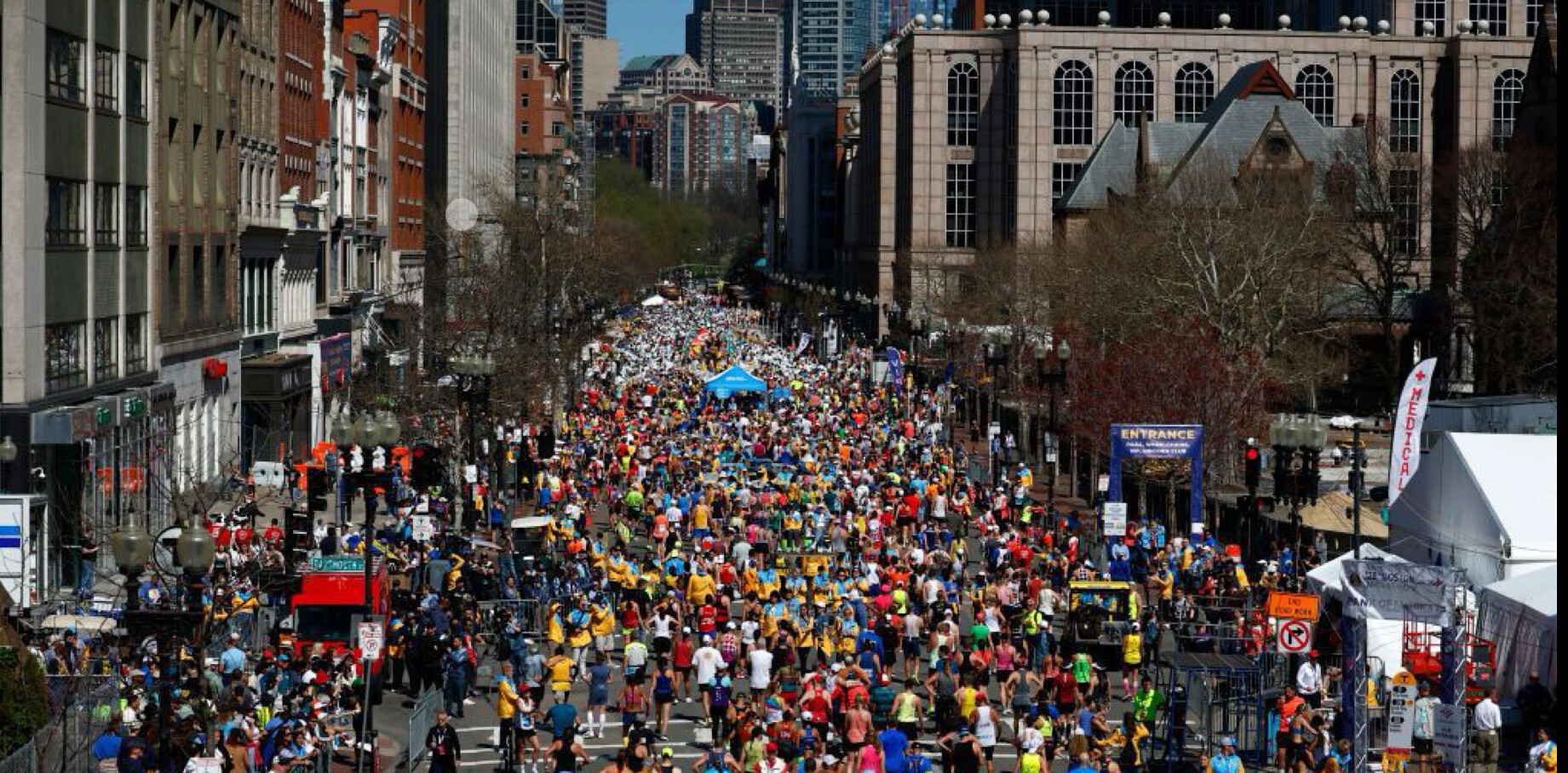
She was aware she had 6 hours from the time the last finisher crossed the starting line to finish the race in order to be considered official.
Her problem? She didn’t know what time the last finisher crossed the starting line.
Caster, 52, from Idlewild, California, was in corral 7 of Boston’s final wave, wave 4. And she crossed the starting line at 11:25 a.m. So for how many more minutes were runners crossing the starting line behind her? “Are they a minute behind me? Five minutes?” she wondered.
Every minute would count for her.
As it turned out, the final starter crossed the line at 11:28 a.m., so Caster needed to finish by 5:28 p.m. to be considered official.
Caster typically runs about 5:40 for a marathon. She finished Tokyo on March 3 in 5:41:50. Tokyo was her fifth of the World Marathon Majors six-star challenge. Boston was to be her sixth.
To gain entry to Boston, she had run for a charity, Team for Kids. She raised more than $5,000—part of the more than $40 million Boston Marathon organizers say the race raises through charity runners every year. And she treated Tokyo as a long run for Boston.
But the weather was warm on Marathon Monday, April 15. The slower runners start later in the day. And from early on, Caster knew she was in trouble. Her stomach was upset. She couldn’t take in all the fluids she needed. She was grabbing ice every time a spectator offered it.
Still, she plugged along, hitting every timing mat—even though the mats are rolled up along the course on pace with the 6-hour finish time. She passed halfway in 2:58:40.
At numerous points, Caster became aware of a vehicle trailing runners like her, who were going at about 6-hour pace. And she asked a volunteer at one timing mat, “How do I know if I’m going to be official?” Caster said he pointed at the car and told her she needed to finish in front of it.
“I was like, okay. That’s a definite answer,” she said. “I’m not going to look at my watch. I’m going to focus on not throwing up and being in front of that car.”
Caster was well ahead of the car on Commonwealth Avenue when she turned right onto Hereford Street. Just to be safe, as she approached the finish line on Boylston, Caster took a final look behind her. No sign of the official car. She crossed at 5:31 p.m., in 6:05:59. Volunteers put her in a wheelchair and sent her to the medical tent. From there, she was transported to a hospital with low blood potassium levels. She was released later that evening.
At the hospital, she looked at the results and realized she was not official. She had a gun time and a net time, but no place.
Caster was devastated. All the training, all the time and expense of pursuing the six stars, and she wasn’t really done. “I’ve worked for years, was so excited to have gotten to this point,” she said of her progress. “I was just leveled.”
Caster’s coach is Meb Keflezighi, an Olympic silver medalist and the 2014 Boston Marathon champion. On the phone with him, she broke down.
He told her, “I couldn’t be prouder of you. You missed it. We both know that you completed all six. You’re not official. But you showed grit, you showed determination.”
Allowing roads to reopen
Caster was not alone. Chris Lotsbom, a BAA spokesman, wrote in an email to Runner’s World that 497 people appeared to have crossed the Boston finish line this year after it officially closed. Volunteers staffed the area and handed out medals for approximately 4 hours, or until 9:45 p.m., longer than the race has ever continued to note times before.
Of those 497, many were within a few minutes or seconds of 5:28 p.m.
Cortney Blackburn, also in pursuit of her sixth star at Boston, missed by 37 seconds.
In an email exchange after the race with BAA officials, she asked how she was to know what the cutoff time was after she had started running. She, too, was told about the car, with flashing lights on the top, going at 6-hour pace and alerting runners if they were falling behind. Blackburn never saw the car—she finished well ahead of it—and she, too, recorded a split at every finish line mat along the way.
Lotsbom confirmed the car was there—a “road reopening vehicle”—he called it, meant to inform runners that roads were reopening and aid stations were shutting down.
“Without knowing specifics, I can’t comment on the individual instances referenced,” he wrote. “I can say that we are reviewing our processes and procedures in regards to final finishers for future Boston Marathons.”
Blackburn crossed the finish line and picked up two medals: the Boston Marathon medal and the World Marathon Majors six-star medal. Only later did she realize she wasn’t official in Boston’s results and therefore isn’t official in the WMM results, either. She has the medals, but no online record of her achievement.
But if the finish line remains open, and the timing continues, why not allow runners to be official? Or at least communicate a time—for example, 5:30 p.m.—that is consistent from year to year? Why use a moving target?
Boston’s strict cutoff is part of the agreement the race has with the cities and towns along the route. The 6-hour time limit is in place “to support the communities throughout which the race runs, to allow their road reopening program to commence as planned,” Lotsbom wrote.
“We understand we could do even more in communicating the closing time on race day and we are looking to enhance that messaging to all runners for next year to ensure everyone is clear [on] the time limit and time that the finish line will officially close on race day,” Lotsbom wrote.
A grace period
A few runners who are much slower than 6 hours get to start in earlier waves, which gives them more time to finish. For some runners close to the 5:28 p.m. cutoff, starting in an earlier corral of wave 4 would have meant the difference between an official and unofficial finish.
In 2015, some members of Boston’s Quarter Century Club, people with 25 or more consecutive Boston finishes, were concerned about the 6-hour limit, which was imposed for the 2016 race. So race officials moved them to Wave 2. Problem solved.
For others, the problem remains. And the moving cutoff appears to affect more women than men, older runners more than younger ones, and many runners of color.
Hector Espinal, like Blackburn, only discovered well after the race that he wasn’t official. He wrote on Instagram on April 18, “Despite crossing the finish line, finishing the race and receiving my medals, this morning I was informed that I did not complete the Boston Marathon in the time allotted to be considered an official finisher and @wmmajors 6 Star Marathoner.”
The post has more than 10,000 likes, and 1,000 comments, the majority of them supportive. Elite runner Mary Ngugi of Kenya, who was sixth in 2:24:24, wrote, “No no, you are a 6 time world major marathoner and a hero.”
Boston is a race that has at times struggled with its image, which critics call elitist. Spectators last year accused the race of over-policing enthusiastic fans, most of whom were people of color, at a mile 21 cheer zone, which prompted a lawsuit. Runner’s World reported in 2022 about the B.A.A.’s obscure, largely white, invitation-only membership group, which is involved with governance of the organization.
To many observers in the running community, setting a fixed finish time would be an easy way to help the race’s image as concerned about runners of varying abilities, not just the front of the pack.
Other races in the World Marathon Majors are much more lax about their finishing times, with the exception of Tokyo, which has nine cutoff points along the route, and runners are stopped if they lag behind. There are no questions, however, about where they stand.
But finishers of London, New York, and Chicago appear in results with times hours slower than the races’ published cutoff times. Berlin, which has a posted cutoff time of 6:15, stays open for an extra 15 to 20 minutes before the Brandenburg Gate closes, according to previous finishers.
Blackburn won’t be back to Boston anytime soon. “I don’t know honestly if I would do it again without major changes to actually be inclusive of non-qualifying athletes,” she wrote in a message to Runner’s World. “I think [B.A.A. officials] are putting out ‘we are trying’ vibes without actually trying.”
Caster, on the other hand, plans to try again. The uncertainty while she was on the course—and the wrong information she was given about the official vehicle—were what upset her. She doesn’t know if it would have made a difference for her had she been aware of the time she had to beat.
“But I would have liked to the opportunity to have tried,” she said. “That’s the part that I’m sore about.”
Login to leave a comment
Naples Daily News Half Marathon is ready for Sunday with COVID-19 protocols in place
A couple thousand runners, shoulder to shoulder, eagerly waiting for the start.
That's been the scene at the start of every Naples Daily News Half Marathon until Sunday.
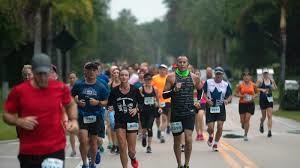
And Mitch Norgart is just fine with that. The president of Gulf Coast Runners, which runs the event, is simply happy there will be a 2021 NDN Half Marathon, no matter what it looks like.
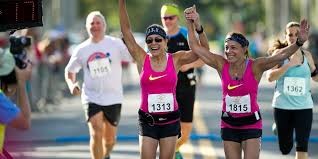
"We're just thankful," Norgart said, pointing as much to the important fundraising for the organization's youth development the Half Marathon creates as to the chance for runners to participate.
Like anyone trying to stage an event during the coronavirus pandemic, the half marathon has taken layers upon layers of planning to keep runners safe. In previous years, it was to keep them safe from things like traffic on the streets of Naples. Now it's entirely something different.
"We have three people that are 10 feet apart start every five seconds," Norgart said. "We can actually start 1,000 people in 15 minutes and keep all of these people at least six feet apart throughout the entire starting process. They have to keep a mask on up until they start the race.
"We hit them with hand sanitizer and a mask and a bottle of water once they cross the finish line. There are no tents, no massage therapy like in previous years or things like that. They get a bag with a banana, orange and a power bar. We ask them to leave the premises."
"We had to give the City of Naples a 10-bullet point outline of how we're going to conduct the races," Norgart said. "We got approval from city council based upon us meeting with Pete DiMaria, who's the fire chief. He's also in charge of emergency command.
"We met with them and the police department, the fire department, and city manager, deputy city manager, and community events."
That race with 150 runners went off well. Gulf Coast Runners hired a videographer who had a drone and a photographer to document the start of the race so they could research how it all went, and also share that with the city.
"We really wanted to prove, not just to ourselves, but to our members and most importantly our powers-that-be at the city, that we could safely stage a race," Norgart said.
For elite runners, there's a different mandate. They must have two negative tests within seven days of the race. And they will line up at 6:55 a.m., ahead of the usual 7 a.m. en masse start. The other reason for that is USATF goes by a gun time, not a chip time. Norgart is well aware of some of the financial situations of runners, so Gulf Coast Runners is offering to cover the cost of the second of the two COVID-19 tests.
"They have to provide us with the proof (of the negative tests)," Norgart said. "Each one of the tests have to be 48 hours apart."
Because runners are generally health-conscious, and Gulf Coast Runners has been very communicative regarding the procedures, Norgart isn't that concerned that protocols will not be followed. Nevertheless, race marshals, volunteers, and even some city police will be on hand to make sure they are. The city also has a mask mandate.
"They are dedicated athletes who, if they want to race a Gulf Coast Runners race ... they know what's expected of them and they risk being disqualified, and they know that," he said.
by Greg Hardwig
Login to leave a comment
Naples Half Marathon
Why run Naples? It's a flat, fast and shady loop. Spirits are always really high, in part from the carbed-up pasta feeds and also because of the really colorful Coolmax shirts! The finish line is where the party begins, with unique quality medals to all finishers who finish within the race time limit, door prizes including weekends at beach front...
more...Prize Money in major races like the Boston Marathon should be awarded based on Gun Time
The weather at this year's Boston Marathon was horrible. Many elite runners and others just could not handle these conditions and did not finish. For the first time I can remember, several female runners that started in wave one placed.
With all the pressure of the media, the B.A.A. is going to hand out cash awards based on chip timing. This year's race should be looked at as unique and I do endorse the B.A.A. decision.
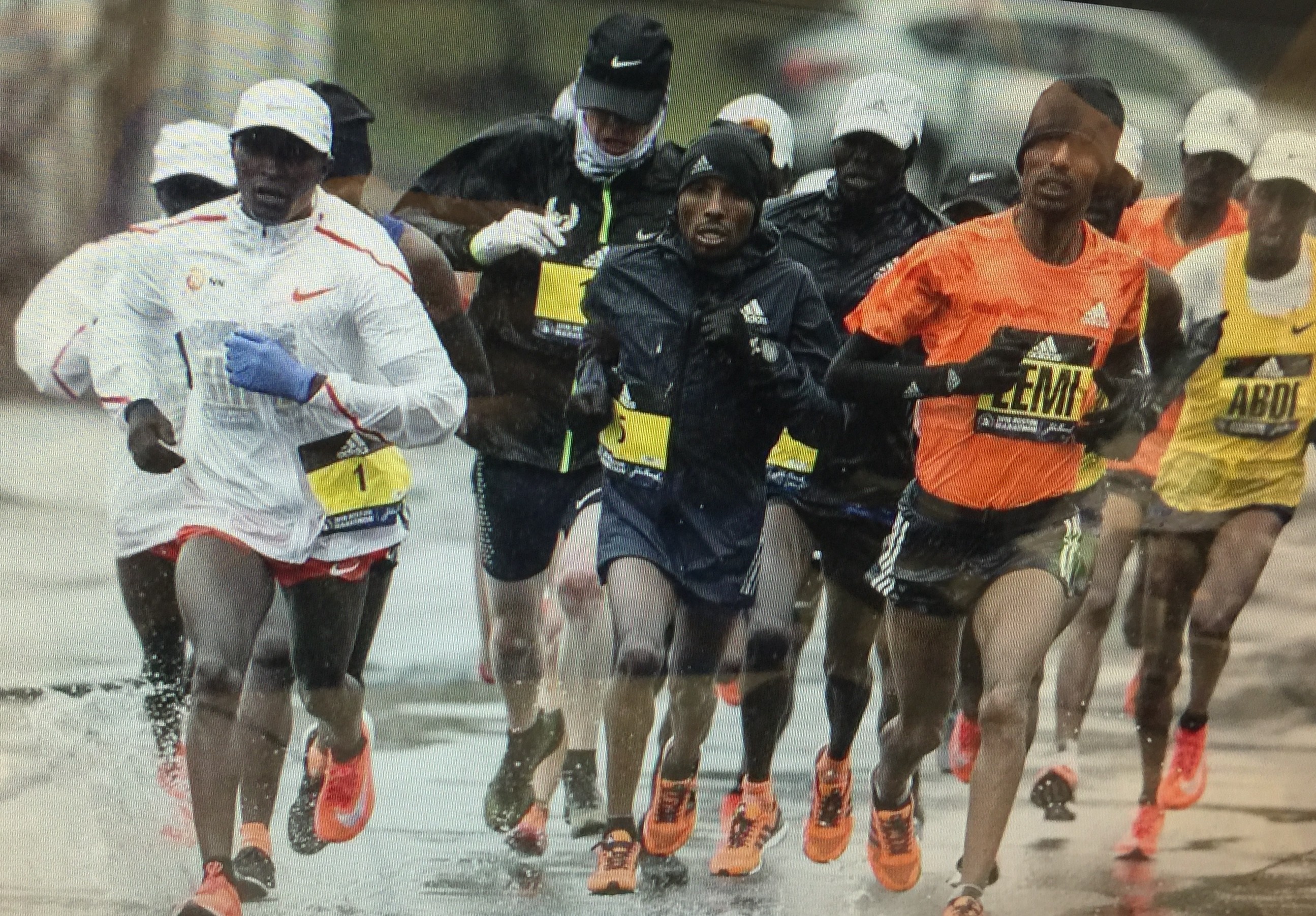
But to change things in the future would not be a good idea. Chip timing works for age-group but most major road races use gun time to award prize money.
In fact, gun time is the only time accepted by both USA Track & Field and the International Association of Athletics Federation.
David Monti, publisher of Race Results Weekly, wrote Sports Day, "To score an elite race based on chip times is both rare and risky. It's risky, because it is possible for an athlete to purposely start well behind the elites, say five minutes, then compete for prize money clandestinely and out of view.
“It's very possible that the first man or woman to break the tape will not actually be the race winner if the race is scored on chip time. How would that look?"
We also know that there are people who cheat. It is much easier to keep track of the smaller elite fields than a field of thousands. I think we do need to stick with gun time in the future for the overall top open places.
by Bob Anderson
Login to leave a comment
Co-Stars of Fixer Upper Chip and Joanna Gaines Silo District Marathon in Waco is set for Sunday
Co-Stars of Fixer Upper, Chip Gaines and his wife, Joanna, met Gabrielle Grunewald last fall in Central Park. Gabe is a professional mid-distance runner who’s been fighting a rare cancer since 2009.
She convinced Gaines that he could train for a marathon in about six months. Grunewald also shared how she's battled adenoid cystic carcinoma since 2009. Gabe’s story left such a mark on Chip that he quickly moved past his goal of running a marathon to actually hosting one in Waco as well.
He and the Magnolia team created Sunday's event the Silo District Marathon to benefit Grunewald's Brave Like Gabe Foundation, which raises funds for research on rare cancers.
"I didn't want to spend another second standing on the sidelines," Gaines wrote in a Jan. 10 blog post announcing the event. "Given what she's gone through, I didn't have any excuse not to give this a shot."
He invited his social media followers to join him. 100% of the profits from the race will be donated to the Brave Like Gabe Foundation in order to further the much-needed research on rare cancers.
It is our honor to come alongside Gabe and others with similar diagnoses to find answers, solutions and, ultimately, cures. Also thinking of the runners as well, the race will present $88,000 in prize money to the top three overall men and women in the half and the full.
The overall marathon winners will receive $15,000 and the half champions will earn $10,000. The prize money is going to be given out based on chip time and not gun time. Hopefully the best time will be the first person to cross the finish line too.
Login to leave a comment
How fast do you need to run to qualify for the 2020 Olympic Marathon Trials
2020 Olympic Trials
Login to leave a comment


